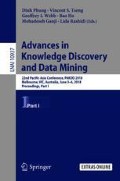Abstract
Explicit measurement of experience, as mostly practiced, takes the form of satisfaction scores obtained by asking questions to users. Obtaining response from every user is not feasible, the responses are conditioned on the questions, and provide only a snapshot, while experience is a journey. Instead, we measure experience values from users’ click actions (events), thereby measuring for every user and for every event. The experience values are obtained without-asking-questions, by combining a recurrent neural network (RNN) with value elicitation from event-sequence. The platform environment is modeled using an RNN, recognizing that a user’s sequence of actions has a temporal dependence structure. We then elicit value of a user’s experience as a latent construct in this environment. We offer two methods: one based on rules crafted from consumer behavior theories, and another data-driven approach using fixed point iteration, similar to that used in model-based reinforcement learning. Evaluation and comparison with baseline show that experience values by themselves provide a good basis for predicting conversion behavior, without feature engineering.
Access this chapter
Tax calculation will be finalised at checkout
Purchases are for personal use only
References
The American customer satisfaction index. http://www.theacsi.org/, http://www.theacsi.org/
Cx index - forrester. https://go.forrester.com/data/cx-index/
Anderson, C.R., Domingos, P., Weld, D.S.: Relational Markov models and their application to adaptive web navigation. In: Proceedings of the Eighth ACM SIGKDD International Conference on Knowledge Discovery and Data Mining, pp. 143–152. ACM (2002)
Balakrishnan, G., Coetzee, D.: Predicting student retention in massive open online courses using hidden markov models. Electrical Engineering and Computer Sciences University of California at Berkeley (2013)
Bollen, J., Van de Sompel, H., Hagberg, A., Bettencourt, L., Chute, R., Rodriguez, M.A., Balakireva, L.: Clickstream data yields high-resolution maps of science. PLoS ONE 4(3), e4803 (2009)
Chylinski, M., Sinha, A., Lie, D.S., Neill, W.: Experience infusion: How to improve customer experience with incidental activities. Marketing Science Institute Working Paper Series (17–106) (2017)
Hochreiter, S., Schmidhuber, J.: Long short-term memory. Neural Comput. 9(8), 1735–1780 (1997)
Kim, Y., Hassan, A., White, R.W., Zitouni, I.: Modeling dwell time to predict click-level satisfaction. In: Proceedings of the 7th ACM International Conference on Web Search and Data Mining, WSDM 2014. ACM (2014)
Kingma, D., Ba, J.: Adam: A method for stochastic optimization (2014). arXiv preprint arXiv:1412.6980
Kivetz, R., Urminsky, O., Zheng, Y.: The goal-gradient hypothesis resurrected: purchase acceleration, illusionary goal progress, and customer retention. J. Mark. Res. 43(1), 39–58 (2006)
Korpusik, M., et al.: Recurrent neural networks for customer purchase prediction on twitter. In: ACM Conference on Recommender Systems (2016)
Lang, T., Rettenmeier, M.: Understanding consumer behavior with recurrent neural networks. In: International Workshop on Machine Learning Methods for Recommender Systems (2017)
Lemon, K.N., Verhoef, P.C.: Understanding customer experience throughout the customer journey. J. Mark. 80(6), 69–96 (2016)
Liu, Z., Wang, Y., Dontcheva, M., Hoffman, M., Walker, S., Wilson, A.: Patterns and sequences: interactive exploration of clickstreams to understand common visitor paths. IEEE Trans. Vis. Comput. Graph. 23(1), 321–330 (2017)
Masten, S.E., Williamson, O.E.: Transaction cost economics. Edward Elgar, Aldershot, Hants, England; Brookfield, Vt. (1995)
Moe, W.W.: Buying, searching, or browsing: differentiating between online shoppers using in-store navigational clickstream. J. Consum. Psychol. 13(1–2), 29–39 (2003)
Novak, T.P., Hoffman, D.L., Duhachek, A.: The influence of goal-directed and experiential activities on online flow experiences. J. Consum. Psychol. 13, 3–16 (2003)
Odijk, D., White, R.W., Hassan Awadallah, A., Dumais, S.T.: Struggling and success in web search. In: Proceedings of the 24th ACM International on Conference on Information and Knowledge Management, pp. 1551–1560. ACM (2015)
Wang, H., Song, Y., Chang, M.W., He, X., Hassan, A., White, R.W.: Modeling action-level satisfaction for search task satisfaction prediction. In: Proceedings of the 37th International ACM SIGIR Conference on Research & Development in Information Retrieval, pp. 123–132. ACM (2014)
Ypma, A., Heskes, T.: Automatic categorization of web pages and user clustering with mixtures of hidden Markov models. In: Zaïane, O.R., Srivastava, J., Spiliopoulou, M., Masand, B. (eds.) WebKDD 2002. LNCS (LNAI), vol. 2703, pp. 35–49. Springer, Heidelberg (2003). https://doi.org/10.1007/978-3-540-39663-5_3
Yu, H., Mahmood, A.R., Sutton, R.S.: On generalized bellman equations and temporal-difference learning. In: Mouhoub, M., Langlais, P. (eds.) AI 2017. LNCS (LNAI), vol. 10233, pp. 3–14. Springer, Cham (2017). https://doi.org/10.1007/978-3-319-57351-9_1
Zhang, X., Brown, H.F., Shankar, A.: Data-driven personas: constructing archetypal users with clickstreams and user telemetry. In: Proceedings of the 2016 CHI Conference on Human Factors in Computing Systems (2016)
Zhang, Y., Dai, H., Xu, C., Feng, J., Wang, T., Bian, J., Wang, B., Liu, T.Y.: Sequential click prediction for sponsored search with recurrent neural networks. In: AAAI, pp. 1369–1375 (2014)
Author information
Authors and Affiliations
Corresponding author
Editor information
Editors and Affiliations
1 Electronic supplementary material
Below is the link to the electronic supplementary material.
Rights and permissions
Copyright information
© 2018 Springer International Publishing AG, part of Springer Nature
About this paper
Cite this paper
Jain, D., Sinha, A.R., Gupta, D., Sheoran, N., Khosla, S. (2018). Measurement of Users’ Experience on Online Platforms from Their Behavior Logs. In: Phung, D., Tseng, V., Webb, G., Ho, B., Ganji, M., Rashidi, L. (eds) Advances in Knowledge Discovery and Data Mining. PAKDD 2018. Lecture Notes in Computer Science(), vol 10937. Springer, Cham. https://doi.org/10.1007/978-3-319-93034-3_38
Download citation
DOI: https://doi.org/10.1007/978-3-319-93034-3_38
Published:
Publisher Name: Springer, Cham
Print ISBN: 978-3-319-93033-6
Online ISBN: 978-3-319-93034-3
eBook Packages: Computer ScienceComputer Science (R0)

